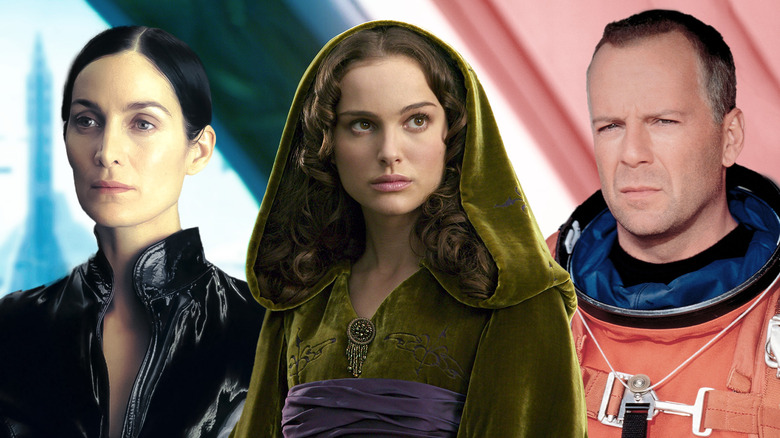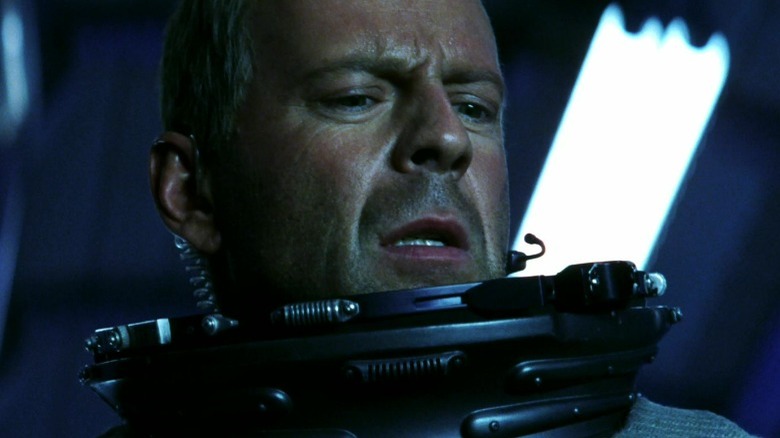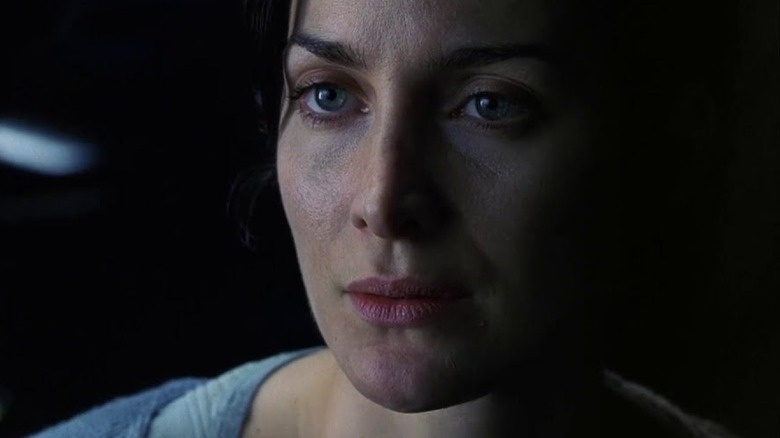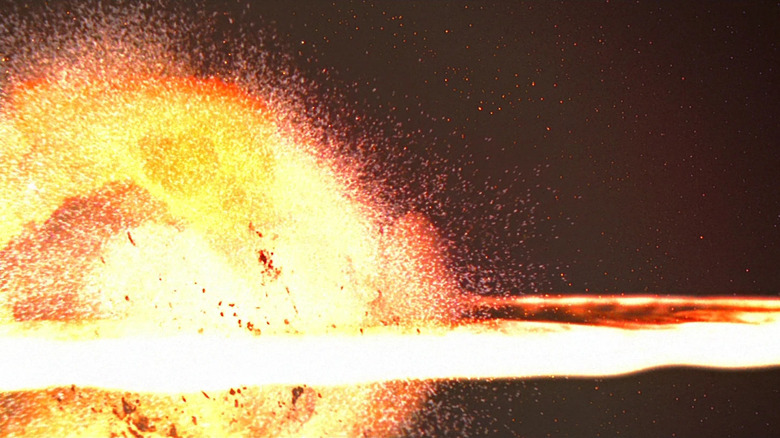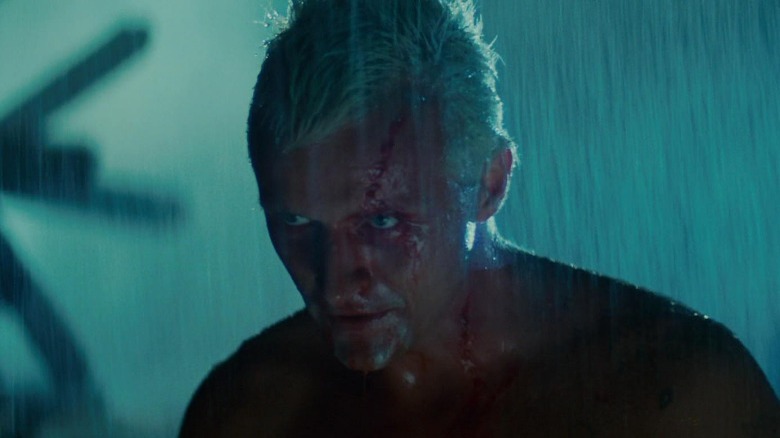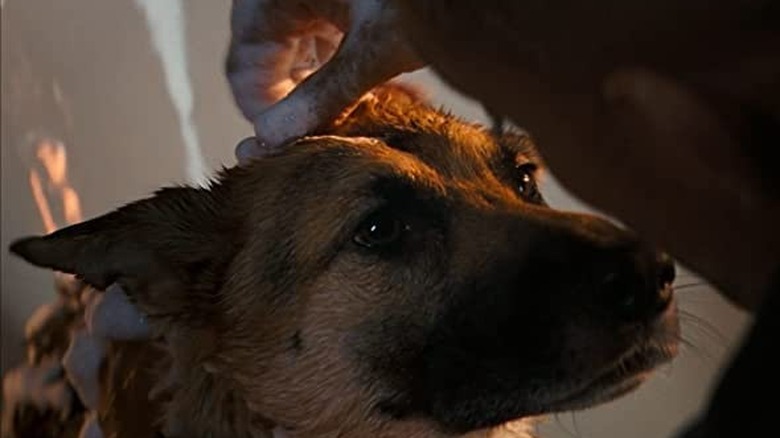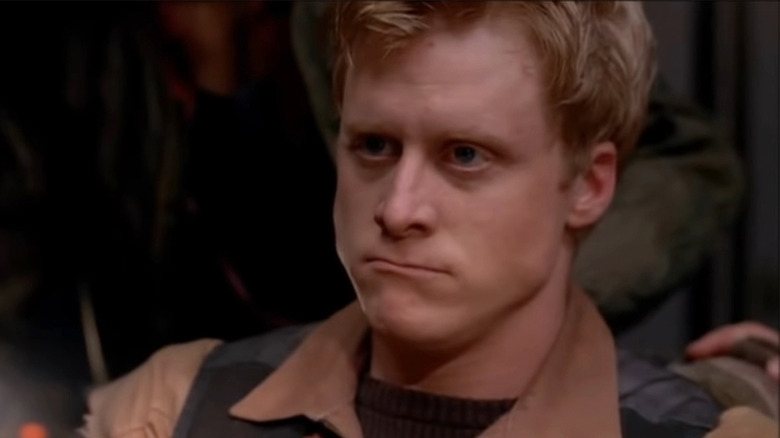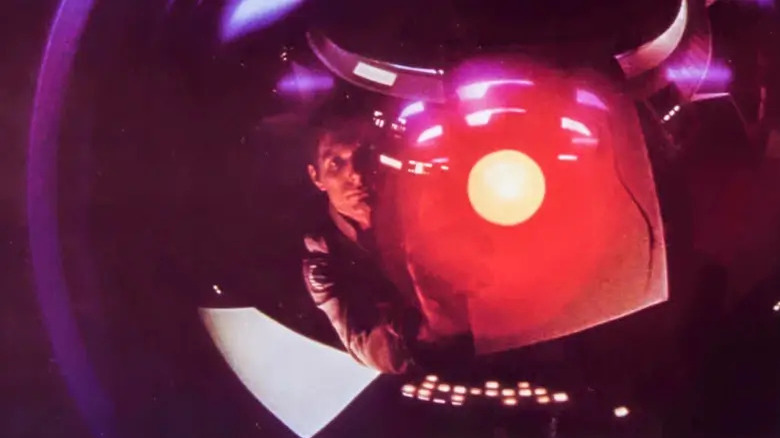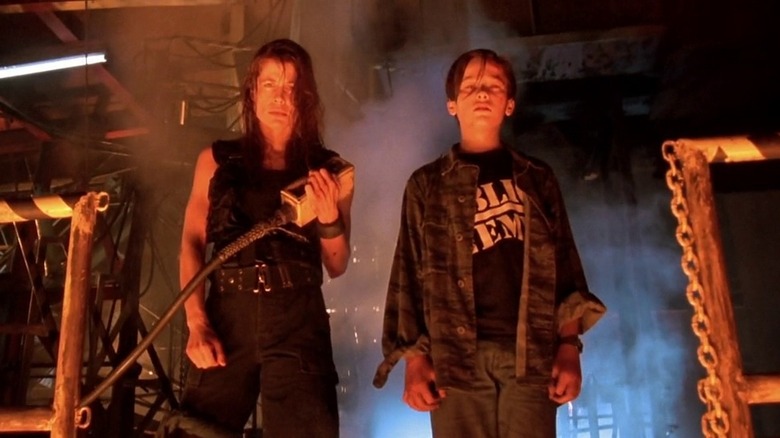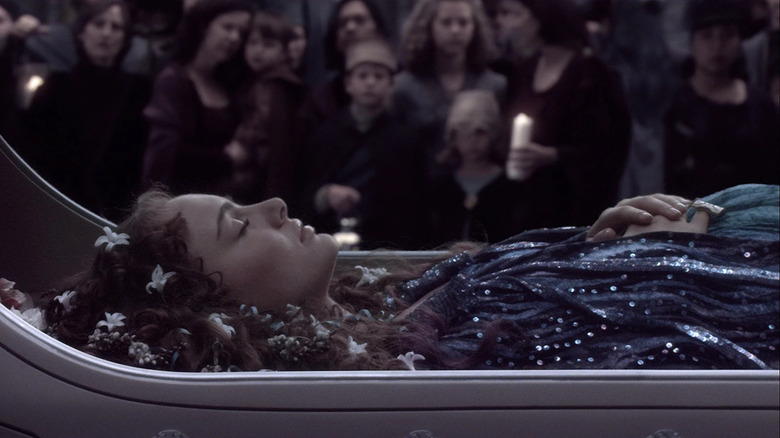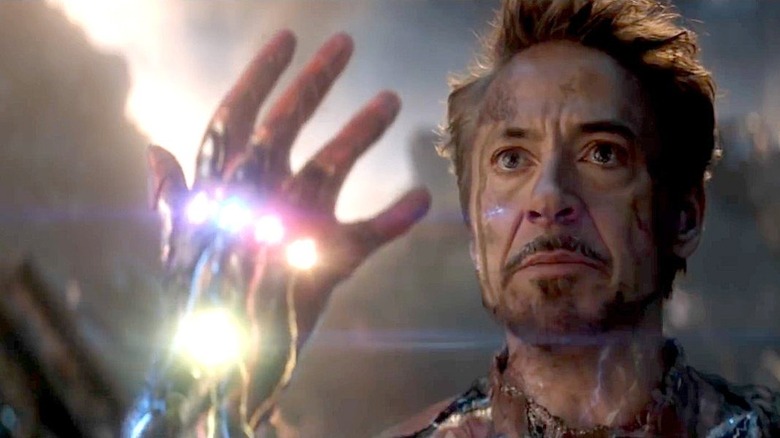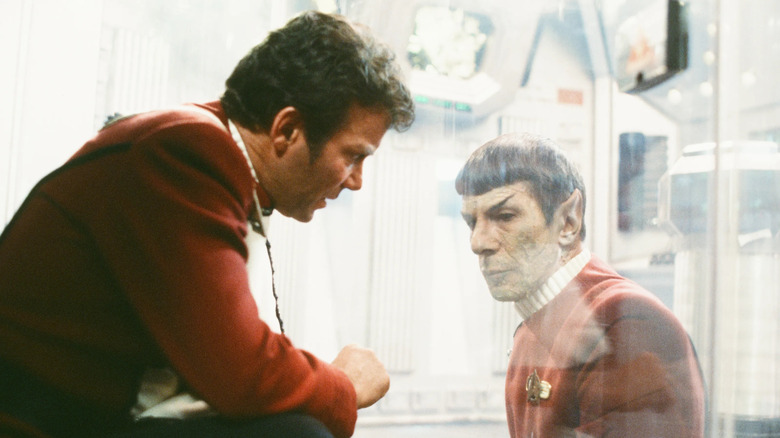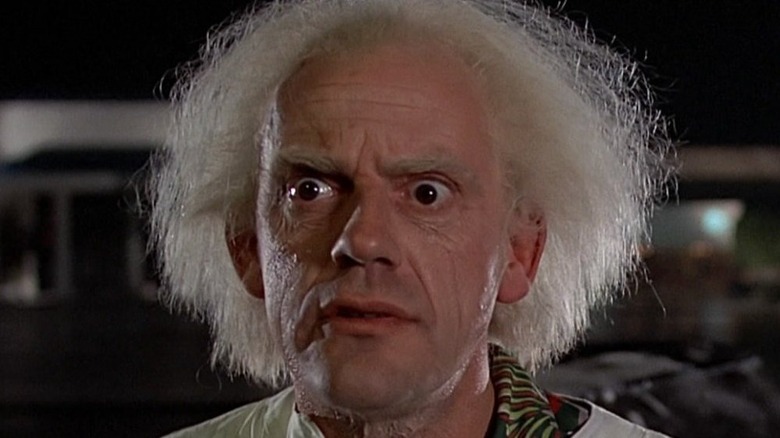Devastating Deaths In Sci-Fi Classics We Still Haven't Recovered From
There's no shortage of death when it comes to science fiction. Whether it's an alien invasion, an intergalactic fight against space dictators, or zombies, it's not easy to survive a sci-fi movie — let alone a franchise. Sometimes, the deaths feel necessary. Other times, they're too much. Yet no matter the circumstances, it's not easy to watch our fan favorites perish.
Deaths like Tony Stark in "Avengers: Endgame" are still raw and fresh wounds, but even older classics like "Star Wars: A New Hope" are quick to spark some heavy waterworks. No matter how often we witness Leia watch her entire planet and family explode, it's just as gut-punching every time. It's not just humans, either. Plenty of the saddest sci-fi deaths revolve around droids, animals, and aliens. All bets are off with this genre.
Unlike most dramas or comedies, deaths aren't always permanent in sci-fi stories. However, even retconned deaths unleash a hefty amount of tears during rewatches. With decades of tragic deaths in the sci-fi genre, here are some of the most devastating sci-fi deaths we'll never get over — whether we're watching for the first time or the 40th.
Armageddon — Harry Stamper
Bruce Willis never fails to give an impactful performance, and his role as Harry Stamper in the 1998 movie "Armageddon" proves that. An oil driller may not be the most likely hero for an asteroid-destroying mission, but that's what sci-fi does best — it turns seemingly ordinary people into heroes following extraordinary circumstances. In order to drill a hole in the asteroid, NASA needs someone who doesn't miss, and that's Harry.
Like many sci-fi heroes that came before and after Harry, he makes the ultimate sacrifice to complete his mission. Harry falls into the trope of fathers who disapprove of their daughter's boyfriends, but that doesn't stop him from growing to like A.J. (Ben Affleck) and taking his place on the fatal mission to detonate the nuclear warhead to destroy the asteroid. A.J. isn't thrilled with Harry taking his place, as it's his job, but Harry reminds him that taking care of his daughter is his job now.
Yet Harry's goodbye with A.J. has nothing on his goodbye call with Grace (Liv Tyler). He apologizes for breaking his promise about coming home, and she tells Harry how proud she is of him and that her best traits came from him. Meanwhile, he tells her that he'll look in on her from time to time and apologizes for not getting to walk her down the aisle before the video cuts out. It's heartbreaking to watch this single dad sacrifice himself for his daughter's happiness, but it's nice to get some onscreen closure — even if dozens of people are watching their goodbye.
The Matrix Revolutions — Trinity
"The Matrix Revolutions" is easily the biggest heartbreaker of the mind-bending original trilogy. Though we may want to forget the unfortunate clothing trends the series inspired, characters like hacker extraordinaire Trinity (Carrie-Anne Moss) made the black pleather sunglass combo worth it.
Though it can be argued that Neo (Keanu Reeves) and Trinity have a bit of an unhealthy relationship, their love for each other is palpable. In Neo's fight to save humanity, Trinity flies him to face his destiny, but ultimately, she finds her own. The ship crashes, and because sci-fi just loves to impale characters, Trinity meets her end via a few pesky pieces of rebars.
During their somber goodbye scene Trinity reassures Neo that he can do this without her and confesses that during her last death, she wanted to tell him that she loved him. She doesn't hesitate this time and asks him to kiss her before she dies in his arms, tears mixed with blood. Little does Trinity know that Neo will face his own death soon. Yet apparently, not even multiple deaths can keep these two lovebirds apart. "The Matrix Resurrections" lives up to this by bringing both characters back from the dead.
Star Wars: A New Hope — Alderaan
We all love Obi-Wan Kenobi and Yoda, but the most devastating death in the original "Star Wars" trilogy isn't the passing of either Jedi Master — it's the decimation of an entire planet. Watching Tarkin (Peter Cushing) hold Princess Leia's (Carrie Fisher) planet hostage to get her to rat out the Rebel base is bad enough. What's even worse is when he decides to blow up her home planet of Alderaan after she gives him a planet name.
The darkest component of this moment doesn't dawn on fans until "Star Wars: Return of the Jedi," when we discover that Vader is Leia's father. Sure, Vader didn't know Leia was his daughter at the time but watching him stand by while Tarkin destroys the only family and home his daughter has ever known is a heartbreaker. While Anakin was busy throwing an intergalactic hissy fit, the Organas stepped up to raise his fearless and commanding daughter. Most fans have to look away from Leia's face when she watches everyone she's ever loved turn to dust.
Like the paternal revelation that comes a film later, two other projects make this scene harder to view. The 2016 standalone movie "Rogue One" takes place before the events of "A New Hope." However, that film puts the Alderaan tragedy into perspective when we witness Jyn (Felicity Jones) and Cassian's (Diego Luna) terror and devastation as the death of Jedha dawns like a deadly sunset. Additionally, seeing the loving bond between Leia and the Organas — not to mention our first real on-screen glimpse at Alderaan — in "Obi-Wan Kenobi" makes this scene much more brutal. RIP Alderaan.
Blade Runner — Roy
Some endings make fans question everything they think they know about a universe, and "Blade Runner" certainly fits that bill. Most of the time, fans don't cry over a villain's death, but occasionally, a villain shows humanity in their final moments that stick with us. Whether it's Darth Vader turning on Palpatine and saving his son in "Star Wars: Return of the Jedi" or Roy (Rutger Hauer) saving Deckard's life in "Blade Runner," one final act of mercy can change everything.
Initially, it seems like Harrison Ford's Deckard is the story's hero, but is he really? On the one hand, replicants are programmed not to feel empathy. Yet the main reason they lack this classic human trait is their limited lifespan, which prevents them from developing as humans do. Given that humans created Replicants to do their dirty work while effectively deciding when they live or die, that sounds a lot like genocide — especially when there's a kill order on them.
Roy's great evil is simply fighting for autonomy over his own life (and death). There may be blood on his hands, but every war has casualties — and Roy didn't make the first move in this one. Though Deckard spends the film hunting Roy down, the Replicant saves his nemesis from falling to his death as his final act. This rare show of humanity at the end of Roy's four years of life shows just what humanity Replicants are capable (and deprived) of. In one of the greatest sci-fi monologues in movie history, Roy notes all of the moments that "will be lost in time, like tears in rain" before acknowledging that it's "time to die" and poetically releasing a dove. If only he had a real chance.
I Am Legend — Sam the dog
No matter how many characters die onscreen, nothing is more devastating than watching a dog die. The classic sci-fi movie "I am Legend" was released a few years before DoesTheDogDie.com first graced our computer screens, and it's easy to see why films like this would spark the site's creation. Sufficed to say, fans had no warning when Robert's dog Sam contracted the virus that turns living beings into Darkseekers — the animalistic mutants who survived the virus.
While people often say dogs are man's best friend, when it comes to Dr. Robert Neville, that cliché is quadrupled. Not only is Sam Robert's best friend, but for a long while, she was his only friend — two seemingly sole survivors in a post-apocalyptic world.
So, when Sam gets bitten by a group of infected dogs, her fate is sealed — and ultimately, so is Robert's. It's difficult to decide which moment of her death is more crushing: Robert softly singing the Bob Marley song "Three Little Birds" or that she doesn't die from the virus. Instead, she begins transitioning into a Darkseeker, and Robert has to strangle his best friend to prevent her from becoming a beast. Thankfully, the worst of it happens offscreen, but Robert's face and the noises Sam makes are more than soul-crushing enough. Not even Robert's own death can compare to losing his beloved companion.
Serenity — Wash
It's always tough when a character's happy ending gets retconned by a future project, and "Firefly" fans got that shock to the system when the movie "Serenity" debuted. The Serenity's pilot Wash (Alan Tudyk) is arguably the most wholesome and fun-loving character in the original series and the film, which makes his death a gut-wrenching shock.
Fans expect casualties during big battle scenes, but Wash expertly lands the Serenity near the end of the movie after a nearly catastrophic crash. So, what's his reward for ensuring that his crew makes it to safety? Getting impaled by a Reaver harpoon. Even worse, the moment comes out of nowhere, with zero time for the audience to prepare. However, Wash mildly foreshadows his death when he says, "I'm a leaf on the wind. Watch out..." only to get impaled seconds later. Still, there aren't any goodbyes or a period of solace before his last breath. He's just gone. Of course, the most brutal moment of Wash's death comes when his wife Zoë (Gina Torres) desperately tries to wake him up and must accept that he's gone far too quickly.
In an interview with CBR, Joss Whedon mentioned that Zoë is pregnant following the events of "Serenity," making Wash's death even more gut-wrenching. He said, "The prospect of being a parent is not something she was prepared for, especially the idea of doing it without Wash." On the one hand, it's nice that she can keep Wash's legacy alive, but on the other, it's not easy to raise a kid by yourself — especially aboard a spacecraft during a war.
2001: A Space Odyssey — HAL 9000
Sci-fi has a way of making fans deeply care about characters, even computers — whether viewers spend a hefty amount of time yelling at Siri or not. In "2001: A Space Odyssey," HAL 9000 is a computer AI that helps run the Discovery One. At times, HAL seems like Big Brother, with eyes following the crew throughout the ship. While HAL ends up being the film's central antagonist and the catalyst for all of the death aboard the ship, his reasoning is ambiguous. Is it a technical glitch? Was he programmed that way? Does his supreme intelligence make it difficult for him to handle human emotions?
Either way, his death is quite sad despite him possibly being a sociopathic computer. HAL mimics human emotion with his soothing voice, and his reaction to Dave (Keir Dullea) disconnecting him is eerie and hard to watch. While he softly pleads with Dave not to kill him, the AI croaks the children's song, "Daisy Bell (Bicycle Built for Two)."
In some ways, the scene drives home how humans like to play God with tech that we barely understand, and in these cases, we're often to blame for our own downfall. Yet reality seems to have learned very little from this genre on that front.
Terminator 2: Judgment Day — T-800
What could possibly be more heartwarming than a once unfeeling cyborg becoming a secondary father figure to a kid and then sacrificing himself to save his surrogate son? There are very few examples of a sequel being better than the original film, but fans have made a strong case for "Terminator 2: Judgment Day," as the follow-up film has as much heart as it does action. The plot revolves around Arnold Schwarzenegger's T-800's task to save a young boy named John Connor (Edward Furlong) who is the future leader of the movement to stop cyborgs from taking over.
Of course, with time travel elements and seemingly impossible missions, there's always sacrifice involved. To prevent Skynet from ever forming in the future, Arnold Schwarzenegger's T-800 has John's mother, Sarah, lower him into a fiery pit to end things before they begin and save the future. The scene reaches its emotional peak when T-800 gives a thumbs up as he drowns in a fiery abyss — something John taught him how to do when they bonded. Even worse, it's the second time that John has lost a father.
Star Wars: Revenge of the Sith — Padmé
There's nothing quite like dying of a broken heart after giving birth to twins, so they have to deal with their megalomaniac father 19 years later alone (and accidentally make out). "Star Wars: Revenge of the Sith" marks the end of Anakin Skywalker's origin story and the end of Padmé's life. Given that the trilogy is a prequel to the events of "Star Wars: A New Hope," we know that the former queen of Naboo doesn't get a happy ending. Still, does she have to get this ending?
Padmé ruled an entire planet at 14 years old with grace, bravery, and diplomacy. She's easily one of the most intelligent and strong-willed people in the galaxy, and it's heartbreaking to see her reduced to little more than a love interest in her final moments. It's rough enough to see Anakin knock her around on Mustafar when he's in his last moments of Dark Side transformation. If that's what ended up killing her, it would be a much more powerful ending for her character and even for Anakin.
Of course, Palpatine makes Anakin think he killed his wife and children, but it would make more sense from a storytelling angle if his treatment of her caused a pregnancy complication and she died in childbirth. Instead, she has nothing physically wrong with her and dies of "a broken heart." So, in addition to being a tragedy, the end of Padmé's story essentially forces her to abandon her kids because she doesn't want to live without Anakin. All in all, Padmé deserves better.
Avengers: Endgame — Tony Stark
"Avengers: Endgame" marked the penultimate movie in Phase 3 of the MCU, and it definitely caused the most waterworks in theaters. Robert Downey Jr.'s Tony Stark kicked off the MCU with "Iron Man" in 2008, and it's safe to say that the franchise likely wouldn't have worked without him. Sure, fans are used to seeing their favorite comic book characters die and get replaced by a new generation. Still, it's never easy — especially when that character has been there from the very beginning.
We watch Tony go from a morally questionable playboy to a devoted father who has more love to give than his heart can handle. Tony sacrifices himself to don the Infinity Stones, take down Thanos, and reverse the Blip. Luckily, we do get closure when he dies. Peter (Tom Holland) tells him, "We won, Mr. Stark," while his right-hand man Rhodey (Don Cheadle) stands faithfully by his side.
The moment gets even more tearful when Pepper (Gwyneth Paltrow) consoles Peter before kneeling down to her husband and telling Tony they'll be okay without him. She says, "You can rest now," and for the first time since he put on the suit, he does. To make matters more heartbreaking, Tony narrates the once-dusted characters' reunions following their return from the Blip — none of which would happen if he didn't make the ultimate sacrifice. If Morgan's reaction to her father's video telling her he loves her 3,000 isn't enough to cue tears, the entire roster of Avengers coming to pay tribute to their fallen friend certainly will be.
Star Trek II: The Wrath of Khan — Spock
Science fiction has no interest in the cliché that what's dead should stay dead, and you can't keep Leonard Nimoy's Spock down for too long. In "Star Trek II: The Wrath of Khan," the Enterprise captain must make a choice when the ship is ready to go down after an attack. Instead of going down with his ship, Spock decides to go down instead of his ship.
However, it's not the act of going into the starship room to take on a massive amount of radiation that does fans in — it's Spock's goodbye to his best friend Kirk (William Shatner) that cues the tears. After Spock tells Kirk that he'll always be his friend, he does the Vulcan salute against the glass in one final goodbye. Though it appeared that Spock was gone for good, the franchise brings him back in the very next movie aptly titled "Star Trek: III: The Search for Spock." Well, they find him. Then they manage to infuse his Katra (essence) back into his body, and voila! No more dead Spock. The scene still stings, though.
Back to the Future — Doc Brown
The Tenth Doctor in "Doctor Who" described time travel the best — "wibbly wobbly timey wimey." It's basically nonsense, but then again, so are the mechanics of time travel. If you think about the technicalities too much, you'll probably get a headache. Though time travel deaths aren't always permanent, that doesn't make them any less of a bummer to watch. "Back to the Future" centers on the adventures of Doc Brown (Christopher Lloyd) and his protégé Marty McFly (Michael J. Fox) as they traverse time in a DeLorean.
In the first film, Marty gives off some Darth Vader vibes when he screams an elongated "No" after a group of criminals shoots down Doc Brown. It's never fun to watch a sci-fi mentor go down like that, even if it's played a little campy. Of course, with the power of time travel at his disposal, Marty goes back in time to leave the good doctor a warning — the space-time continuum be damned. In take two, Doc wears a bulletproof vest, allowing the franchise to rake in that sequel money.
